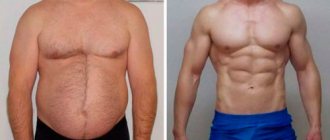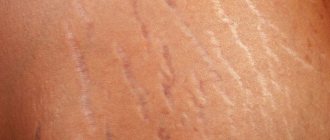Myth. If you train very intensively, you can immediately lose several kilograms.
Indeed, professional athletes can lose 5-7 kg
. After all, to get results they have to use all the resources of their body. However, you should not follow their example - weight loss in this case is mainly due to liquid, and the amount of fat changes slightly. And an ordinary untrained body simply cannot withstand such a load.
How to lose weight through sports?
Basic rules of training, diet and useful links in the material for those who want to learn how to lose weight correctly and reliably.
I can only lose weight in the problem area
The topic of local fat burning is perhaps one of the most controversial in modern fitness. There are many factors that influence where fat is stored in the body - gender, age, genetics, lifestyle, etc. Women most often experience problems in the hips, waist, arms and buttocks. Is it possible to remove excess fat with isolated exercises only there? Scientists think not.
To change a certain part of the body, you will have to work hard and stick to proper nutrition. Alternating cardio and strength training is considered more effective. A good example is high-intensity HIIT training.
The fat that is broken down in the body and used as fuel during prolonged exercise can come from any part of the body, not just the part that is stressed the most. Ultimately, weight loss comes down not to targeted exercise, but to a basic principle: the ratio of the calories you expend to the calories you consume.
Myth. Anyone can become skinny
The goals that a person sets for himself must correspond to reality. Each person has a different body type, and it is determined genetically, and is not developed through training: some are small and stocky, others are tall and thin. “By the way, athletes choose a sport in which they can achieve the best results, including based on their body type and constitution
, since these qualities are practically impossible to train,” says Korochkin.
“By nature, a large person cannot become slender, and one should not be surprised if this does not happen.”
Detox diet will do everything for me
“Detox” is a medical term that has become a marketing strategy. Cleansing is not a way to lose weight, but a preventative measure. Of course, it entails a slight weight loss, but this is a consequence of unloading the body, and not the primary goal. Real cleansing of the body is carried out exclusively in specialized institutions and only as prescribed by a doctor.
It has been proven that if there are no diagnosed diseases, the liver does an excellent job of cleansing itself, and the kidneys remove harmful elements along with urine.
Myth. There are exercises to burn fat in specific areas
When burning fat, the bet must be placed on the entire body, starting the process of fat breakdown. If it works successfully, the stored reserves will begin to decrease throughout the body
.
This process can be slightly accelerated in a certain place, for example, by intensively training the abdominal muscles. But you need to understand that by this moment active breakdown of fat should already occur throughout the body. The muscles themselves must be loaded correctly: do not do the maximum number of repetitions of exercises for a specific muscle group. It is much more important to emphasize the correct execution
of the exercises.
Then there will be less fat in these areas of the body.
Myth. There should be no fat on the body
The human body has areas where the presence of fat is physiologically determined. There it remains as long as possible - for example, in the kidney capsule or on the buttocks and thighs of women. Additionally, fat is essential
for optimal functioning of the body.
For example, a common symptom of low fat in a woman’s body is the cessation of menstruation and, as a result, the inability to conceive a child. Therefore, it is impossible to strive for the complete destruction of fat reserves. Structure your workouts in such a way as to effectively remove excess fat deposits
. And remember that the patterns of fat deposition in certain places are individual for each person.
Eliminating fat from your diet will stop weight gain
Fats perform a number of vital functions in the body: they serve as a source of energy, regulate the production of certain hormones, stimulate brain activity, help absorb various vitamins, and much more. It is important to give up not all fats, but only those that are harmful (saturated and trans fats).
Eating healthy fats, such as avocados, flax seeds, walnuts, and almonds, on the contrary, help you lose weight. Moreover, numerous studies have shown that high-fat, low-carb diets cause weight loss. One of the brightest and most obvious examples is the keto diet.
Myth. There are creams and other means to burn fat in certain places.
Nowadays, a variety of products are actively advertised, the manufacturers of which guarantee weight loss in the right places: ointments, creams, muscle stimulants and even clothing. Ointments and creams
produce a purely cosmetic effect, improving the appearance of the skin.
Smoother skin appears to belong to a slimmer body. Special underwear
can optimize the load during training and increase fluid loss (including from adipose tissue) in a specific location.
However, one cannot expect more active breakdown of fats locally. Myostimulators
make the muscle work, but do not involve it in physiological movement patterns - that is, these muscles are not used in everyday life.
So after such a workout, muscle work in this region will not contribute to a more intense breakdown of adipose tissue.
Magazine for pharmacy business professionals
In the summer, many people set out to get rid of extra pounds and begin intense and sometimes grueling workouts.
However, very often hard work on yourself does not bring the desired result. Why? The point is common misconceptions that prevent us from losing weight “according to science.”
Let's look at some of them. Our expert: Svetlana Pugacheva,
multiple world and European champion in fitness, personal trainer of the highest category
Myth 1. Proper nutrition is nonsense, I work so hard in the gym and on the treadmill that my body inevitably burns all the excess fat.
To lose weight, you need to burn more calories than you consume, it's true. But if you don’t control your diet, a “ravenous appetite” after heavy physical exertion is unlikely to allow you to maintain the desired negative balance. However, even if this works out, there is a risk that you will lose weight not only from fat, but also from muscle tissue. Without a balanced diet, which implies the intake of a sufficient amount of protein (which is 1-2 g per 1 kg of weight), the body will not receive amino acids, the very building blocks that make up muscle tissue and are involved in many physiological processes. Therefore, in order for intense training to bring benefits and not harm, you need to eat right.
Myth 2. The faster I run, the faster I lose weight.
The most common misconception. Meanwhile, it is known that at maximum heart rate, when we run, panting with all our strength, the main source of energy is glucose and glycogen, and adipose tissue is practically not consumed. To ensure the fat burning process, you need to run slowly, half-heartedly. Yes, yes, it is at 50–60% of the maximum heart rate that fat reserves are used with maximum intensity. For many people, this heart rate is achieved simply by fast, active walking, you don’t even need to run anywhere!
Myth 3. To lose weight, you don’t need strength training - on the contrary, you will only gain weight.
Many women avoid working on machines or with barbells for fear of building up large muscles. Indeed, muscle is heavier than fat, and if it grows as a result of training, the weight may remain the same for some time. But a person with developed muscles always looks slimmer than someone who does not train with weights, provided that they are the same height and weight. Also, developed muscles take a lot of energy and calories to support themselves, which is why strength training is very effective when it comes to losing weight.
Myth 4. Sleep and rest are not important - the main thing is more training.
Recovery, muscle growth, and their adaptation to increasing loads occur during sleep with the participation of various hormones, such as melatonin and somatotropin. With a lack of sleep, their balance is disrupted, which leads to disruption of physiological processes associated with regeneration. Moreover, without full recovery it is impossible to conduct high-intensity training. It is important to go to bed on time and sleep at least 8 hours a day.
Myth 5. You have to choose one thing: either a barbell, or fitness, or running.
For the full development of all systems - muscular, ligamentous, cardiovascular and even digestive - it is better to combine different types of training. Strength exercises in the gym, aerobics, dancing, Pilates, yoga, street jogging and swimming in the pool - the more varied the load, the better. But you need to combine them correctly and observe the measure, avoiding injuries.
Myth 6. It’s easier and easier to lose weight without physical activity, simply by forcing yourself to eat less.
In fact, you can achieve weight loss by dramatically cutting back on calories. But the figure will look sluggish and asthenic. With a low-calorie diet, you are unlikely to feel good, and you will most likely no longer have enough strength and energy even to perform daily routine activities. In addition, periods of such “hunger strikes” often end in breakdowns, as a result of which the lost kilograms are returned in excess. So the combination of sports and rational nutrition is a much more promising way to combat excess weight, allowing you not only to lose weight, but also to maintain and increase vigor and health.
Muscles are not only beauty and strength, they are also our “energy station” that burns excess calories. Trained, “pumped up” muscles spend energy even during sleep.
How will be correct?
To create a competent training plan, you need to adhere to basic principles.
- Regularity
. Our body loves consistency, so if you exercise to the limit, but rarely and irregularly, you are unlikely to achieve serious results. Train at least 3 times a week for 60–90 minutes every other day at moderate intensity. Daily 20-minute workouts are also suitable if you can't commit more time at a time. - Mandatory warm-up
. Preparing the body for the main loads is a very important part of the program. Don't neglect warming up to avoid injury. And after training, devote a few minutes to stretching exercises (cool down).
- Breath
. This is the main point under any load: the health-improving effect of training depends on the proper functioning of the diaphragm and the entire respiratory system. Breathe evenly, inhale through your nose, exhale through your mouth, regardless of the type of activity, whether it is running, aerobics, barbell, Pilates, etc.
- Graduality
. A gradual increase in load will give the body time to adapt. During your first workouts, do only one approach for all muscle groups. Once you feel that you have become stronger and more resilient, increase to 2, then to 3-4 approaches. The same with weights, start small, then lift more. This applies to running too. First, brisk walking for 10–15 minutes, then switch to light short jogging interspersed with walking. And only then increase the time to 30–45 minutes in a separate workout.
- From simple to complex
. Start with easy exercises, then make them more difficult. For example, first learn to squat, and then do lunges on one leg. Or master simple jumping ropes, and then double jumps. Or run on a flat track and then practice running uphill and downhill.
- Best time to train
. Determine experimentally when you feel best to exercise. This is due to your natural biorhythms. For one it is early in the morning, for another it is before lunch, and for a third it is only in the evening.
- Rest
. Sleep at least 8 hours a day. The older a person is, the more time he needs to recover. If you didn't get enough sleep at night, take at least 15–20 minutes to rest during the day before you take a nap. See how this will energize you for the rest of the day.
- Nutrition
. Throw out all fast food from your menu, leaving only foods that are valuable for the body: fish, meat, poultry, cottage cheese, cheese, vegetables, cereals and fruits. Moreover, try to devote at least 30–40% of your diet to protein products. It is proteins that contain the building material for our muscles, ligaments, skin, hair, and nails. That leaves 40–50% for carbohydrates and 10–20% for fats. Eat small meals, at least 3 times a day, and preferably 5 or 6. Distribute proteins evenly at each meal, but the main carbohydrates should be for breakfast and lunch. If the training according to the plan is in the interval between them, then you will be able to carry it out with maximum efficiency.
Magazine "Russian Pharmacies" No. 5, 2021
Other articles you may like:
Anatomy of success
Let's not lose shape!
With the beginning of autumn, outdoor training becomes more and more difficult, and you don’t want to lose your shape.
How can you replace jogging or cycling without leaving home? How to save to... Read more
Anatomy of success
Service with a quality mark
Not everything in a real pharmacy can be changed or improved, but at least one most important component of the pharmacy business depends entirely on us - the quality of service.
This is exactly what... Read more
Anatomy of success
Developing flexibility
Soft or flexible skills are usually called the business qualities of an employee that are not directly related to his professional competencies, but help him work better and ...
Read more
Anatomy of success
This is a complete failure!
Failing to fulfill a sales plan, missing a deadline, making a serious mistake during consulting – this happens in everyone’s life.
What happened will have to be taken for granted. More details
Anatomy of success
Rollers are great!
Every spring and summer, more and more newcomers, young and old, get up on them. You can learn to ride safely quite simply and quickly if you follow the basic rules and prepare the necessary equipment...More
What you need to know
There are no miracle cures or exercises for burning fat in specific places, and losing several kilograms in one workout, although realistic, is not useful and does not give long-term results, since it is achieved through fluid loss.
However, properly structured training allows you to get not quick, but very lasting results. Tags:
- Workout
- Diets
- Overweight
- Weight loss
- Korochkin
To leave a comment you must be an authorized user
Fasting is the best way to lose weight
Any strict diets and prolonged fasting do not benefit the body. They are ineffective in the long term, because sustainable weight loss is only possible through lifestyle and habit changes.
Why shouldn't fasting be used for weight loss? The initial weight loss during fasting is what is called liquid or "water weight" rather than fat. Over time, muscle loss is inevitable. After returning to a normal diet, the weight comes back and this only makes it more difficult to lose weight again.
Giving up food is a fairly radical measure, it can have a serious impact on your health, so it is completely dangerous to do it without medical supervision. Side effects include dizziness, headaches, low blood sugar, muscle pain, weakness and fatigue. And prolonged fasting can lead to anemia, a weakened immune system, and problems with the liver, kidneys and heart.











